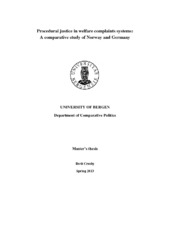| dc.description.abstract | The thesis investigates to what extent Norwegian and German complaints systems secure procedural justice for welfare claimants. Complaints systems are important mechanisms for protection of citizen's welfare rights. The large number of welfare claimants affected by decisions made in the welfare administration and the significance of these decisions to the individual are important motivations for this thesis. Moreover, the presence of procedural justice, or lack thereof, may have broader consequences in terms of systemic legitimacy. The theoretical framework is based on theories of procedural justice. Seven criteria are deduced from the literature which together constitute an ideal type of procedural justice. The criteria include consistency, independence, voice, quality, transparency, timeliness and financial risk. The thesis is a case study of Norway and Germany, including both within-case and between-case analysis. Data is drawn from public documents, existing research, as well as expert interviews of officials from complaints agencies in Norway and Germany. Three goals are addressed: (1) In terms of theory, the objective is to systematize existing research on procedural justice and present a coherent framework applicable to empirical evaluation of real-world institutions; (2) Empirically, the aim is to present the Norwegian and German complaints systems in a comprehensive manner; (3) By merging these contributions, the systemic characteristics are discussed in terms of criteria of procedural justice in order to illuminate strengths and weaknesses of the systems given the theoretical assumptions. The discussion concludes that: (1) The Norwegian case secures procedural justice with regards to timeliness, and to a large degree on the criteria quality, transparency and financial risk. However, the criteria of geographical and systemic consistency, independence and voice are not fulfilled; (2) For the German case, the ideal of procedural justice is secured with regards to systemic consistency, independence, voice, quality and transparency. The answer to the criteria of geographical consistency and financial risk are more ambivalent, while the timeliness is far from attaining an ideal of procedural justice. The question remains whether there are inherent practical trade-offs in the fulfillment of some of the criteria. Prioritizations of some aspects of procedural justice on behalf of others might prove inevitable and perfect attainment of procedural justice thus infeasible. Further research can broaden knowledge through larger comparisons including more cases within the same universe. The empirical effects of the complaints systems should also be further investigated, implying the acquisition of more knowledge in depth. | en_US |
